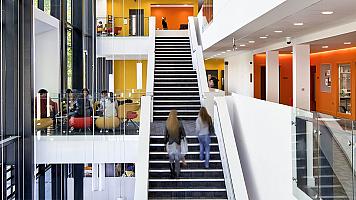BSc (Hons)
Marketing
Content navigation menu
Why study BSc Marketing at Goldsmiths
This degree explores marketing and its interdisciplinary links, combining psychology, sociology, anthropology and management.
- The structure of the degree unites two forces: meeting the educational requirements of a Marketing and Business undergraduate degree, and integrating the different disciplines.
- You will learn about the foundations of marketing theory and practice such as product development, service design, promotion and advertising, brand management and consumer behaviour.
- You will apply your marketing skills in practice, especially in the areas of strategic marketing, market research and digital marketing.
- The degree will introduce you to management theory and practice, organisational behaviour, and economics. You will learn how a company works, and how marketing decisions are part of company strategy.
- The degree will prepare you for work in large, multinational and small-to-medium-sized organisations that are global in nature, innovative, entrepreneurial and digitally cutting-edge.
- You can expect to develop transferable skills in critical thinking, reflection, time management, leadership, written and verbal communication, and numeracy, and to undertake research on an individual and group basis.
- Creativity and interdisciplinarity are at the heart of everything we do here at Goldsmiths and in the Institute of Management Studies, from the programmes and modules we run, to the activities, masterclasses and lecture series they complement. Join us to embark on your own unique, important and unforgettable journey.
Contact the department
If you have specific questions about the degree, contact Mark McCulloch or Ivan Zupic.
UCAS code
N500
Entry requirements
A-level: BBB
BTEC: DDM
IB: 33 points overall with three HL subjects at 655
Length
3 years full-time
Fees
Home - full-time: £9250
International - full-time: £19640
Department
Watch videos about the course
What you'll study
Year 1 (credit level 4)
In your first year, you'll take the following compulsory modules:
| Module title | Credits |
|---|---|
| Strategic Management | 15 credits |
| Introduction to Marketing | 15 credits |
| Foundations of Economics 1: Theories | 15 credits |
| Identity, Agency & Environment 1 | 15 credits |
| Finance and Accounting | 15 credits |
| Marketing Management | 15 credits |
| Identity, Agency & Environment 2 | 15 credits |
| Foundations of Economics 2: Business Applications | 15 credits |
Note about optional modules (if available): The above is indicative of the typical modules offered, but is not intended to be construed or relied on as a definitive list of what might be available in any given year. The module content and availability is subject to change.
Work Placement module
Our Work Placement Module is your chance to dive into real-world industry experience, which not only helps you grow your network but also gives you a peek into the professional world. Excitingly, some students have landed job offers right after their placement!
Teaching style
This programme is taught through scheduled learning - a mixture of lectures, seminars and workshops. You’ll also be expected to undertake a significant amount of independent study. This includes carrying out required and additional reading, preparing topics for discussion, and producing essays or project work.
How you'll be assessed
You’ll be assessed by a variety of methods, depending on your module choices. These include coursework, examinations, group work and projects.
Entry requirements
We accept the following qualifications:
A-level: BBB
BTEC: DDM
International Baccalaureate: 33 points overall with three HL subjects at 655
UAL Extended Diploma: Merit overall
Access: Pass with 45 Level 3 credits including 30 Distinctions and a number of merits/passes in subject-specific modules
Scottish qualifications: BBBBC (Higher) or BBC (Advanced Higher)
European Baccalaureate: 75%
Irish Leaving Certificate: H2 H2 H2 H2
Alternative qualifications
See our full list of undergraduate entry qualifications.
We welcome students with a range of educational experiences. If you believe you may not meet the standard qualification requirements we would still encourage you to apply because we consider all aspects of your application when making a decision.
We’ll pay particularly careful attention to your personal statement, which is your opportunity to demonstrate your interest in the subject you’ve applied for. Your referees are also welcome to include any relevant contextual comments around your academic achievements. We’ll look at all these things when making a decision on your application, as well as your qualifications and grades, and may still be able to offer you a place.
International qualifications
We also accept a wide range of international qualifications. Find out more about the qualifications we accept from around the world.
If English isn’t your first language, you will need an IELTS score (or equivalent English language qualification) of 6.0 with a 6.0 in writing and no element lower than 5.5 to study this programme. If you need assistance with your English language, we offer a range of courses that can help prepare you for degree-level study.
Fees and funding
Annual tuition fees
These are the UG fees for students starting their programme in the 2024/2025 academic year.
- Home - full-time: £9250
- International - full-time: £19640
If your fees are not listed here, please check our undergraduate fees guidance or contact the Fees Office, who can also advise you about how to pay your fees.
It’s not currently possible for international students to study part-time if you require a Student Visa, however this is currently being reviewed and will be confirmed in the new year. Please read our visa guidance in the interim for more information. If you think you might be eligible to study part-time while being on another visa type, please contact our Admissions Team for more information.
If you are looking to pay your fees please see our guide to making a payment.
Funding opportunities
We offer a wide range of scholarships and bursaries, and our careers service can also offer advice on finding work during your studies. Find out more about funding your studies with us.
Additional costs
In addition to your tuition fees, you'll be responsible for any additional costs associated with your course, such as buying stationery and paying for photocopying. You can find out more about what you need to budget for on our study costs page.
There may also be specific additional costs associated with your programme. This can include things like paying for field trips or specialist materials for your assignments. Please check the programme specification for more information.
What our students say

Careers
How we prepare you for work
The versatile nature of the degree means that its graduates would appeal to different sectors within the industry.
- Graduates from this degree can work in the marketing function of companies as a marketing manager, brand manager, advertising and promotion manager, marketing strategist, marketing analyst, sales manager, or a PR officer.
- Given the strong market research focus of the degree, graduates can also work as a marketing auditor, and market researcher within companies, market research agencies and consultancies.
- BSc graduates have the potential to work in advertising and marketing agencies as creatives, account managers, media planners, art directors, sales promotion executives, and event organisers.
The interdisciplinary approach of this programme will give you the chance to gain expertise in a complementary field (eg psychology) that will provide you with a competitive advantage in obtaining marketing-related jobs. The versatile nature of the degree will also give you the chance to find jobs in related departments within organisations (ie not only in marketing departments).
Finally, this programme provides the training and the knowledge-base for proceeding onto a Masters and/or PhD degrees, in fields such as Marketing, Management, Economics, Psychology, Sociology, Media and Communications, and Cultural Studies.
Find out more about employability at Goldsmiths. You can find out more about the career options open to you after you graduate on our Management Studies careers pages.
Skills
This programme was created to give you a diverse set of skills that will help you to successfully overcome the challenges of a constantly evolving economy. We help you develop not only the technical skills necessary in becoming a successful marketers today, but also the ability to understand societal change and adapt as the world changes. This prepares you for a number of careers in a wide variety of industries.
Technical skills
• Data collection
• Qualitative and quantitative data analysis
• Using computer software for data collection and analysis
• Presentations skills and report writing
• Using online database and resources
Broader skills
• Understanding consumer trends
• Ability to translate consumer insights into marketing strategy
• Knowledge of the core marketing concepts and their application inside and outside the company
• Ability to contextualise marketing knowledge within social sciences
You'll also gain skills in teamwork, time management, organisation, critical-thinking, reflection and independent research. All of these skills are greatly sought after by graduate employers.
Study Abroad
Goldsmiths offers students the opportunity to study abroad at one of its partner universities worldwide. During this term-long exchange, students can earn credits that count towards their degree upon returning to Goldsmiths.
Most undergraduate students partake in this experience during the autumn or spring term of their second year. Funding through the Turing Scheme can support with living costs during the study abroad period.
Find out more about Study Abroad





